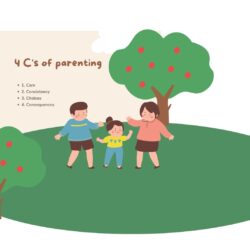Parent-child relationships are an essential component of human life. These ties begin with the birth of a child and continue to develop throughout their life. They have a profound impact on an individual’s emotional, psychological, and social development. While many parent-child interactions are positive and helpful, when needs are not satisfied, they can generate tension and anxiety. In this post, we will look at the various ways that parent-child interactions can be difficult, as well as the repercussions of unmet needs. We will also talk about how to mend these connections and meet those requirements.
Understanding Unmet Needs
Unmet needs in parent-child relationships refer to the emotional, psychological, or physical requirements of a child that are not adequately fulfilled by their parents or caregivers. These unmet needs can vary greatly in nature, and their impact can be long-lasting. Recognizing and addressing unmet needs is crucial for fostering healthy parent-child relationships and ensuring the well-being of the child.
Types of Unmet Needs
- Emotional Needs: Emotional needs are perhaps the most critical for a child’s development. These needs include love, affection, emotional support, and validation. When children do not receive these essential emotional nutrients from their parents, it can lead to feelings of inadequacy, low self-esteem, and emotional distress.
- Physical Needs: Physical needs encompass necessities such as food, clothing, and shelter. Inadequate provision of these needs can result in physical harm or neglect, endangering the child’s well-being.
- Safety and Security Needs: Children require a safe and secure environment where they can explore, learn, and develop without fear. A lack of physical or emotional safety can create anxiety, and fear, and hinder a child’s overall growth.
- Cognitive and Intellectual Needs: Parents play a crucial role in stimulating a child’s cognitive development. Neglecting these needs can hinder intellectual growth and curiosity.
- Social Needs: Social interaction is vital for a child’s development. The absence of opportunities for social interaction and learning can lead to loneliness and difficulties in forming healthy relationships.
Consequences of Unmet Needs
Unmet needs in parent-child relationships can have far-reaching consequences, affecting various aspects of a child’s life and shaping their future interactions and relationships. Some of the common consequences include:
- Low Self-Esteem: Children who do not receive emotional validation and support from their parents may struggle with low self-esteem, which can manifest as self-doubt and insecurity in later life.
- Trust Issues: Unmet needs can lead to trust issues, making it difficult for individuals to form secure and trusting relationships with others.
- Emotional Distress: Children who experience ongoing unmet emotional needs may suffer from anxiety, depression, or other emotional disorders in adulthood.
- Difficulty in Nurturing Others: Individuals who have not had their own emotional needs met may struggle to provide emotional support to their children or loved ones.
- Behavioral Issues: Unmet needs can manifest as behavioral problems in children and adolescents, such as aggression, defiance, or withdrawal.
- Repetition of Patterns: Individuals may unconsciously recreate the same unmet needs in their adult relationships, perpetuating the cycle of unfulfilled needs.
Addressing Unmet Needs
Recognizing and addressing unmet needs is a complex process, but it is essential for the well-being of both parents and children. Here are some strategies to consider:
- Self-Awareness: Parents need to reflect on their own childhood experiences and how they may have been impacted by unmet needs. Understanding one’s past can be the first step toward breaking the cycle of unfulfilled needs.
- Communication: Open and honest communication between parents and children is crucial. Encourage your child to express their feelings and needs, and actively listen to them without judgment.
- Seek Professional Help: If unmet needs in your parent-child relationship are causing significant distress, it may be helpful to seek the guidance of a qualified therapist or counselor. They can provide tools and strategies to address these issues.
- Forgiveness: Both parents and children may need to work on forgiveness. Forgiving a parent for not meeting your needs does not excuse their actions but can free you from carrying the burden of anger and resentment.
- Boundaries: Setting healthy boundaries within the parent-child relationship is essential. It allows both parties to maintain their autonomy and protect their emotional well-being.
- Parenting Education: Parents can benefit from parenting classes and resources that provide insights into child development, communication techniques, and strategies for meeting their children’s needs.
- Self-Care: Parents should take care of their own emotional and physical needs to be better equipped to meet their children’s needs.
- Patience and Persistence: Healing unmet needs is a process that takes time and effort. It’s important not to get discouraged by setbacks and to remain persistent in working towards a healthier parent-child relationship.
Also check: 7 Ways To Improve Gut Health of Kids: A Parent’s Guide
Conclusion
Parent-child relationships can be both wonderful and challenging. Sometimes, things don’t go as planned and this can create emotional, psychological, and social problems that can last a long time. However, it is possible to address and heal these issues. By being aware of our feelings, talking openly with our loved ones, and seeking help when needed, we can work together to resolve any problems and create happier, healthier relationships. It might not be easy, but the rewards of healing and growth are worth it, leading to a brighter future for both parents and children.





